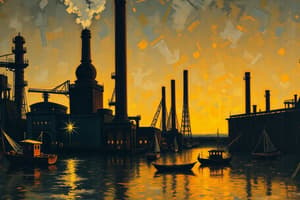Podcast
Questions and Answers
What material replaced iron during the Industrial Revolution, leading to advancements in machinery and transportation?
What material replaced iron during the Industrial Revolution, leading to advancements in machinery and transportation?
- Copper
- Steel (correct)
- Plastic
- Aluminum
Which invention by Thomas Edison contributed significantly to the illumination of homes and cities?
Which invention by Thomas Edison contributed significantly to the illumination of homes and cities?
- Electric generator
- Telegraph
- Light bulb (correct)
- Typewriter
Which transportation development was powered by petroleum during the Industrial Revolution?
Which transportation development was powered by petroleum during the Industrial Revolution?
- Bicycle
- Internal combustion engine (correct)
- Steam ship
- Horse-drawn carriage
What major change did Henry Ford's assembly line introduce during the Industrial Revolution?
What major change did Henry Ford's assembly line introduce during the Industrial Revolution?
What was a negative impact of the Industrial Revolution on workers, according to the concerns raised at the time?
What was a negative impact of the Industrial Revolution on workers, according to the concerns raised at the time?
According to Karl Marx, what societal division did industrial capitalism create?
According to Karl Marx, what societal division did industrial capitalism create?
What was a significant communication advancement during the Industrial Revolution?
What was a significant communication advancement during the Industrial Revolution?
What was one of the primary reasons for the establishment of labor unions during the Industrial Revolution?
What was one of the primary reasons for the establishment of labor unions during the Industrial Revolution?
Flashcards
Steel
Steel
A stronger material that replaced iron in manufacturing, enabling the creation of faster and lighter machinery, ships, and railways. It played a crucial role in the Industrial Revolution.
Electricity
Electricity
A powerful energy source that revolutionized the Industrial Revolution, powering homes, factories, and cities. It enabled 24-hour operation and fueled the production of goods.
Communication Technology
Communication Technology
The invention of the telephone and radio dramatically improved communication, connecting people globally and facilitating trade.
Transportation Revolution
Transportation Revolution
Signup and view all the flashcards
Henry Ford's Assembly Line
Henry Ford's Assembly Line
Signup and view all the flashcards
Negative Impacts of Industrialization
Negative Impacts of Industrialization
Signup and view all the flashcards
Marx's View of Industrial Capitalism
Marx's View of Industrial Capitalism
Signup and view all the flashcards
Communist View of Industrialism
Communist View of Industrialism
Signup and view all the flashcards
Study Notes
Factors Affecting the Revolution
- Steel replaced iron, with Great Britain, France, Germany, and Belgium producing over 32 million tons
- Steel use increased in faster/lighter machinery, ships, and railways
Electricity
- Electricity rose, converting to other energy forms
- Practical generators (electric current, hydroelectric, coal-fired steam) were developed
- The light bulb (Thomas Edison, Joseph Swan) lit homes and cities, 24-hour factories supplied market demand
Communication
- Communication connected people, easier trade
- Alexander Graham Bell (telephone, 1876) and Guglielmo Marconi (long-distance radio, 1901) changed communication perception
Transportation
- Transportation changes: street cars, steam ships, railroads, subways
- Petroleum (new power source) led to world economy growth
- Internal combustion engine (1903) led to the first flight (Orville and Wilbur Wright)
- Regular passenger air service (1919)
Impact on People's Lives
- Henry Ford's assembly line increased goods production efficiency, higher wages, lower cost goods
- Industrial revolution made society harder on workers (unfavorable conditions in factories)
Industrial Revolution & Society
- Social political parties and labor unions formed due to horrible working conditions
- Karl Marx (capitalism's negative impact), society divided into bourgeoisie (middle-class) and proletariat (working class)
- Communists viewed overproduction of goods as creating useless people, advocating for abolition of private property
Studying That Suits You
Use AI to generate personalized quizzes and flashcards to suit your learning preferences.




